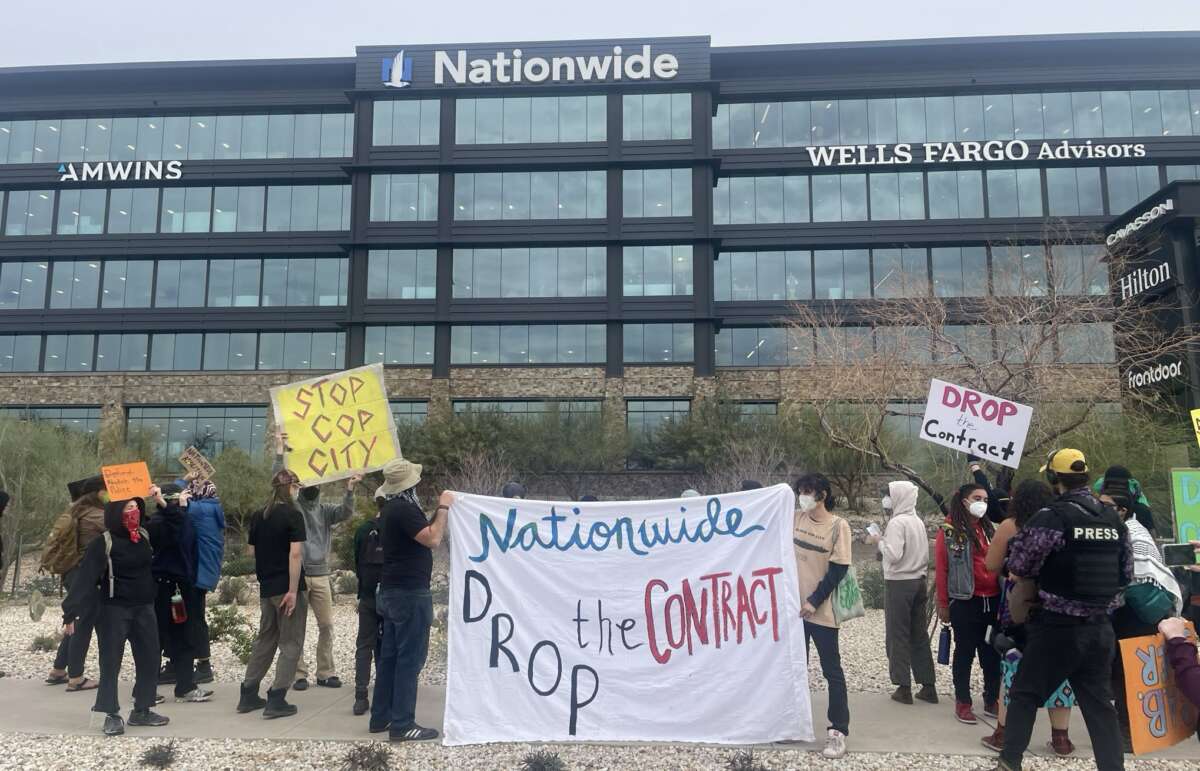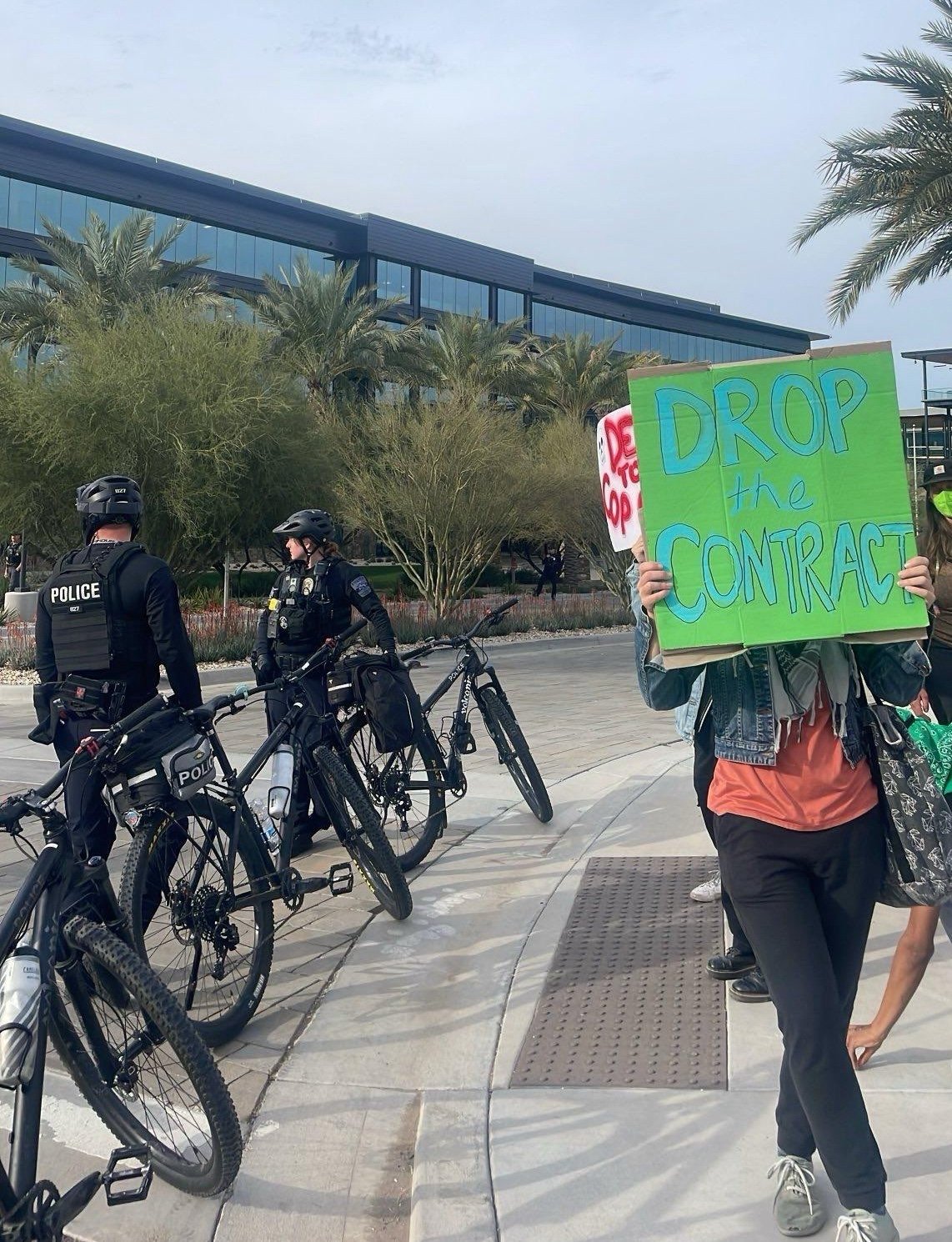STOP COP CITY
Activists targeted insurers and investors in Tucson as the Georgia legislature and police target organizers in Atlanta.
By Candice Bernd ,
February 26, 2024

Organizers who attended the Nationwide Summit to Stop Cop City in Tucson, Arizona, rally outside the primary insurer of the Cop City project in Scottsdale, Arizona, on February 26, 2024.
SASHA BERKMAN
Truthout is a vital news source and a living history of political struggle. If you think our work is valuable, support us with a donation of any size.
UPDATE: At least six activists were arrested later Monday after blockading the entrance to a gated community in Fountain Hills, Arizona, by duck-taping their hands to concrete-filled tires. An executive of Nationwide Insurance allegedly lives in the subdivision.
On Monday morning, about 50 activists and organizers targeted the offices of the primary insurer of the $109 million police training center under construction in unincorporated DeKalb County, Georgia, that opponents have dubbed “Cop City.” A few activists briefly blocked entrances before rallying outside the Scottsdale, Arizona, offices of Nationwide Mutual Insurance Company subsidiary Scottsdale Insurance Co. Truthout first obtained Cop City’s certificate of insurance, which revealed the company’s involvement, in May 2023.
The action capped off the four-day Nationwide Summit to Stop Cop City in Tucson, Arizona, in which activists from more than 30 Weelaunee Defense Society chapters across the United States held camp at a parking lot near Mansfield Park and organized decentralized workshops and panels focusing on the interconnections between proposed police training facilities across the country, violence on the border, and Israeli apartheid and genocide, among other linkages. Activists refer to forested area of the Cop City site as “Weelaunee,” the Mvskoke word for the watershed, in part to highlight the tribe’s forced relocation from the area in the 1830s.
“The movement stop Cop City has experienced pretty significant repression, from the killing of Tortuguita, to the three raids that happened [this month], to the [Racketeer Influenced and Corrupt Organizations (RICO)] charges,” said Sasha Berkman, who requested a pseudonym and traveled to the Tucson summit from Austin, Texas, in an interview with Truthout. “But the Nationwide Summit has been a way to retake the initiative to show that we aren’t afraid to expand the struggle nationwide to Nationwide [Insurance Company].”

Truthout is a vital news source and a living history of political struggle. If you think our work is valuable, support us with a donation of any size.
UPDATE: At least six activists were arrested later Monday after blockading the entrance to a gated community in Fountain Hills, Arizona, by duck-taping their hands to concrete-filled tires. An executive of Nationwide Insurance allegedly lives in the subdivision.
On Monday morning, about 50 activists and organizers targeted the offices of the primary insurer of the $109 million police training center under construction in unincorporated DeKalb County, Georgia, that opponents have dubbed “Cop City.” A few activists briefly blocked entrances before rallying outside the Scottsdale, Arizona, offices of Nationwide Mutual Insurance Company subsidiary Scottsdale Insurance Co. Truthout first obtained Cop City’s certificate of insurance, which revealed the company’s involvement, in May 2023.
The action capped off the four-day Nationwide Summit to Stop Cop City in Tucson, Arizona, in which activists from more than 30 Weelaunee Defense Society chapters across the United States held camp at a parking lot near Mansfield Park and organized decentralized workshops and panels focusing on the interconnections between proposed police training facilities across the country, violence on the border, and Israeli apartheid and genocide, among other linkages. Activists refer to forested area of the Cop City site as “Weelaunee,” the Mvskoke word for the watershed, in part to highlight the tribe’s forced relocation from the area in the 1830s.
“The movement stop Cop City has experienced pretty significant repression, from the killing of Tortuguita, to the three raids that happened [this month], to the [Racketeer Influenced and Corrupt Organizations (RICO)] charges,” said Sasha Berkman, who requested a pseudonym and traveled to the Tucson summit from Austin, Texas, in an interview with Truthout. “But the Nationwide Summit has been a way to retake the initiative to show that we aren’t afraid to expand the struggle nationwide to Nationwide [Insurance Company].”

Organizers who attended the Nationwide Summit to Stop Cop City in Tucson, Arizona, rally outside the primary insurer of the Cop City project in Scottsdale, Arizona, on February 26, 2024.
SASHA BERKMAN
Berkman was referring to years of intense police-perpetrated repression and violence since the movement to Stop Cop City first formed in 2021, including the 2023 fatal shooting of Manuel Esteban Paez Terán, the first environmental protester killed on U.S. soil at the Cop City site; SWAT-style raids on three houses in Atlanta on February 8; and at least 61 Stop Cop City activists who have been charged under Georgia’s state-level RICO statute.
Tucson police detained at least five people Sunday night following a separate protest in which about 90 activists marched through downtown as some smashed windows at Wells Fargo and a PNC offices, according to organizers. A Wells Fargo executive sits on the board of the Atlanta Police Foundation, the nonprofit backing Cop City. PNC is a funder of the Mountain Valley Pipeline, which activists also oppose. Local Tucson Stop Cop City activists are planning to demonstrate outside Tucson Police Department headquarters to demand activists’ release.
Berkman was referring to years of intense police-perpetrated repression and violence since the movement to Stop Cop City first formed in 2021, including the 2023 fatal shooting of Manuel Esteban Paez Terán, the first environmental protester killed on U.S. soil at the Cop City site; SWAT-style raids on three houses in Atlanta on February 8; and at least 61 Stop Cop City activists who have been charged under Georgia’s state-level RICO statute.
Tucson police detained at least five people Sunday night following a separate protest in which about 90 activists marched through downtown as some smashed windows at Wells Fargo and a PNC offices, according to organizers. A Wells Fargo executive sits on the board of the Atlanta Police Foundation, the nonprofit backing Cop City. PNC is a funder of the Mountain Valley Pipeline, which activists also oppose. Local Tucson Stop Cop City activists are planning to demonstrate outside Tucson Police Department headquarters to demand activists’ release.
Truthout obtained Cop City’s certificate of insurance as activists and students target the project’s investors. By Candice Bernd , TRUTHOUT May 8, 2023
“Starting [Sunday], we moved into action mode, and different affinity groups started taking a variety of actions, from nighttime spray-painting to combative street marches in which two banks that are funders of the project were vandalized,” Berkman tells Truthout. Overall, he says, the gathering has been beautiful and affirming event for organizers. “There were lots of cultural events, poetry readings, a rave in the desert where we were surrounded by cacti, and a punk show.”
Continued Repression in Atlanta
The summit in Arizona is wrapping as organizers in Atlanta engaged in a diversity of tactics, including a legal ballot referendum campaign, face heightened police repression in the form of SWAT-style raids and continued surveillance as Democratic city leaders deliberately stall a signature-verification process that could put Cop City on a May or November ballot.
Vote to Stop Cop City Tactical Coordinator Marisa Pyle tells Truthout that, even after passing legislation codifying regulations for the city’s referendum process that reintroduced a signature-matching process decried by both voting rights groups and Democratic Party leaders in other contexts, city leaders are essentially “hiding behind” an expected federal appeals court ruling on the legality of the group’s petition-gathering process to delay tallying the signatures. Arguments in that case were heard in December, and a decision could come at any time.
The appeals court challenge came after a federal judge ruled in favor of residents in unincorporated areas of Dekalb County who argued they were unfairly excluded from the petition drive despite living near the training center site. The city appealed after the judge’s order expanded residency requirements for canvassers and restarted a 60-day timeline to gather signatures, allowing the coalition to deliver nearly double the required signatures in September. The city has refused to begin the verification process until the appeals court issues a decision.
“There is nothing about the appeal legally that prevents [the city] from starting a verification process. They are choosing to use it as an excuse.”
“There is nothing about the appeal legally that prevents [the city] from starting a verification process. They are choosing to use it as an excuse,” Pyle told Truthout. If the city began verifying the 16 boxes of 116,000 signatures stacked up in the clerk’s office, the issue could possibly make a May ballot if the appeals court doesn’t issue a ruling against the coalition before then.
In that scenario, the city would have 50 days to verify at least 58,000 signatures. The coalition members say they’re confident they’ll cross the threshold despite the city’s suppressive matching process that will almost certainly throw out a fraction of the signatures. A negative appeals court ruling, however, could derail the referendum process even further.
But Pyle points out that Atlanta City Council members could also just choose to pass legislation putting the matter on the ballot directly. In fact, members did just that last week for an unrelated issue, easily passing legislation allowing a referendum vote on a six-year, 1 percent sales tax for water and sewer projects on the same May 21 special election ballot organizers also want to see Cop City on.
While the referendum coalition hasn’t faced nearly the same level of police repression as other organizers who have engaged in tactics like nonviolent direct action, Pyle says the entirely legal campaign has still been met with intimidation and harassment. A local open records request obtained a June 2023 report by the Atlanta Police Department’s Homeland Security Unit, a task force that monitors for potential domestic terrorism activity, depicting an Instagram post of Pyle posing with boxes of collected signatures.
But other opponents of Cop City, she says, have it much worse. Earlier this month, state and federal law enforcement officers raided several organizers’ homes, forcing a woman out of her house topless, displaying a nude photo of a separate woman, and dragging out one man by his hair. Police arrested one activist, John Mazurek, on a charge of first-degree arson in connection to an incident in July in which eight police motorcycles were set alight. Activists burned construction equipment at least twice in January, and another pair locked themselves to an Atlanta construction site linked to Brasfield & Gorrie, a Cop City contractor.
The pre-dawn February 8 raids on the three houses were the third SWAT-style operations in residential areas of Atlanta and unincorporated DeKalb county tied to the Stop Cop City movement. The Guardian reported that a search warrant authorized FBI agents to confiscate laptops, cellphones, “Defend the Atlanta Forest” stickers and posters, and personal journals.
“The house is still in disarray, and it feels basically like it’s been burglarized. They broke several doors, and so we’re having to repair those and put a lot of effort into it. And obviously, it’s isolating because they stole people’s phones and electronics.”
Stop Cop City organizer April, who requested a pseudonym, owns one of the homes that was raided this month but wasn’t present at the time of the raid. April told Truthout that FBI agents refused to show her roommates and allies a broadly written federal search warrant and confiscated electronics, stickers and a poster related to the movement. The residents were detained in a police vehicle for more than an hour that morning before being released.
April said the aftermath of the raid has created a lingering environment of fear for the household. “The house is still in disarray, and it feels basically like it’s been burglarized,” she told Truthout. “They broke several doors, and so we’re having to repair those and put a lot of effort into it. And obviously, it’s isolating because they stole people’s phones and electronics and things that they use to keep themselves safe…. It feels like political targeting based on our being locals who support the movement and have been vocal about our advocacy on behalf of the movement as neighbors.”
Georgia Lege Intensifies Repression
In addition to the 61 Cop City activists who have been indicted for violating Georgia’s RICO act, at least 42 activists have pending domestic terrorism charges. Now, the state legislature is seeking to expand the state’s domestic terrorism statute even further. Last week, the legislature introduced Senate Bill 523, which would create two new felony crimes punishable by up to 20 years in prison for providing “material support or resources” for “terrorism.” The bill also criminalizes broadly defined “acts of terrorism.”
Pyle, who is also currently lobbying lawmakers at the State Capitol during the current Georgia General Assembly session, tells Truthout she watched a hearing on the bill last week, and that the bill’s language was initially so vague it had to be amended in order to not sweep up defense attorneys as providers of “material support” for domestic terrorism.
“It potentially criminalizes things like street medic training … and makes that prosecutable as terrorism.”
“It potentially criminalizes things like street medic training … and makes that prosecutable as terrorism,” she told Truthout. “It’s also quite odd, because sometimes the domestic terrorism statute in Georgia has lower sentencing guidelines than this bill, which would mean somebody could do something that is defined as domestic terrorism and receive a one-year sentence, but somebody who helped them or provided like a de-escalation training for them could potentially get 20 years.”
Pyle and the American Civil Liberties Union of Georgia point out that prosecutors in the state are already using overly broad state-level domestic terrorism and RICO statutes to paint those indicted as criminals based on activities including camping, occupying trees, protesting, and now, even taking basic measures to protect digital privacy.
Last month, Deputy Attorney General John Fowler argued in state court that 19-year-old Ayla King’s mere possession of a simple cellphone without internet capability indicates the activist’s criminal intent to commit conspiracy under Georgia’s RICO statute. The argument poses serious civil liberties implications for anyone engaging in protected First Amendment activity who takes similar steps to protect their digital privacy, including using a VPN or encrypted messaging platforms like Signal.
The recent moves add to other repressive measures taken by the legislature this session in a clear effort to quell dissent against those organizing in opposition to expanded militarized policing infrastructure. On February 6, the state legislature passed a bill mandating cash bail for offenses like racketeering, domestic terrorism, criminal trespass and “unlawful assembly.” It would also drastically limit bail funds’ ability to bond out protesters who engage in nonviolent civil disobedience, such as locking their bodies to construction vehicles.
The voter suppression and police repression efforts at both the state and local level in Georgia and Atlanta is why organizers like Pyle continue to emphasize that the movement against Cop City should remain national and mustn’t be tied to the specific location of the proposed police training center in unincorporated DeKalb County, as the summit in Tucson this weekend clearly demonstrated.
“Atlanta is not the only city with a private police foundation. Atlanta is not the only city now where these multimillion-dollar training center complexes are being proposed.”
Pyle points out that Atlanta’s Cop City is far from the only militarized police training center slated for construction in the country: Researcher Renee Johnston recently mapped at least 69 proposals for similar police training facilities across the U.S. The only states that currently don’t have any such plans are Wyoming, North Dakota and Vermont.
“It’s been very clear that this is a test case in what people will accept,” Pyle tells Truthout. “The movement has kind of grown and gotten national support. I think it’s very encouraging because it shows that there’s a way for folks to resist this when it comes to their community too, because Atlanta is not the only city with a private police foundation. Atlanta is not the only city now where these multimillion-dollar training center complexes are being proposed.”

CANDICE BERND is senior editor/staff reporter at Truthout. Her work has also appeared in several other publications, including The Nation, In These Times, the Texas Observer, The Real News Network, Salon, Rewire News Group, Sludge, Scalawag, YES! Magazine and Earth Island Journal. Her work has received awards from the San Francisco Press Club, the Fort Worth chapter of Society of Professional Journalists, the Native American Journalists Association, and the Dallas Peace and Justice Center. Follow her on Twitter: @CandiceBernd.

No comments:
Post a Comment